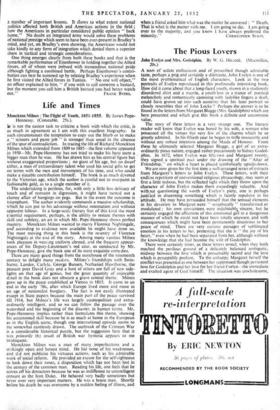Life and Times
Monckton Milnes : The Flight of Youth, 1851-1855. By James Pope- Hennessy. (Constable. 25s.).
kr is not the easiest task to criticise a book with which the critic, is as much in agreement as I am with this excellent biography. In such circumstances the temptation to copy out the blurb or to make a " scissors and paste job " is stronger than usual in the absence of the spur of contradiction. In tracing the life of Richard Monckton Milnes which extended from 1809 to 1885—the first volume appeared in 1950—Mr. Pope-Hennessy has not tried to make his hero seem a bigger man than he was. He has drawn him as his central figure but without exaggerated proportions no giant of his age, but no dwarf either, a man of extraordinary talent who used his social gifts to get on terms with the men and movements of his time, and who could make a sizeable contribution himself. The book is as much devoted to the Victorian age, which the author is careful not to overpaint in fashionable gold, as to a single member of it.
The undertaking is perilous, for, with only a little less delicacy of touch and of restraint in digression, it might have turned out a clumsy affair of hangings on pegs. But in the event the outcome is triumphant. The author evidently commands a massive scholarship, which he can put to his advantage without ostentation and without apparent latiour. In a large-scale literary feat of this kind the most e3sential requirement, perhaps, is the ability to restate themes with skill and subtlety, an art in which Mr. Pope-Hennessy shows perfect mastery. Monckton Mimes wanted to marry Florence Nightingale, and according to evidence now available he might have done so. The most moving thing in this book is the re-entry of Florence Nightingale at the end of the story. Among many vanities Milnes took pleasure in wearing uniform abroad, and the frequent appear- ances of his Deputy-Lieutenant's red coat, as conducted by Mr. Pope-Hennessy, give the book one of its most exquisite comedies.
There are many good things from the storehouse of the nineteenth century to delight many readers. Milnes's friendships with Swin- burn; Landor, Carlyle, George Bunsen, Nathaniel Hawthorne, the peasant poet David Gray and a host of others are full of new side- lights on that age of genius, but the great quantity of enjoyable detail in the book does not obscure a grave central theme. Milnes grew up in the peace established at Vienna in 1815. It came to an end in the early '50s, after which Europe lived more and more in an age of nationalist burglary. The fact is not easily illustrated except in State papers because the main part of the peace survived till 1914, but Milnes's life was largely cosmopolitan and extra- ordinarily intelligent, and so we can follow the passage over the watershed and the beginning of the disaster, in human terms. Mr. Pope-Hennessy implies rather than formulates this theme, showing his accustomed skill because he is as much at home in the European as in the Englislt_scene, though one international episode seems to me somewhat carelessly drawn. The outbreak of the Crimean War is a considerable historical puzzle, but the suggestion here that it was primarily the result of British war hysteria appears to me inadequate.
Monckton. Milnes was a man of many.,imperfections and a strikingly open and honest mind. He hid none of his weaknesses, and clid not publicise his virtuous actions, such as his admirable work of social reform. He provided an excuse for the self-righteous to look down their noses, a disposition which has not been lost in the century of the common man. Reading his life, one feels that he scores off his detractors because he was as indifferent to unintelligent censure as the Iron Duke. He behaved very, badly sometimes but never over very important matters. He was a brave man. Shortly before his death he was overcome by a sudden feeling of illness, and
when a friend asked him what was the matter he answered : " Death. That is what is the matter with me. I am going to die. I am going over to the majority, and you know 1 have always preferred the


































 Previous page
Previous page